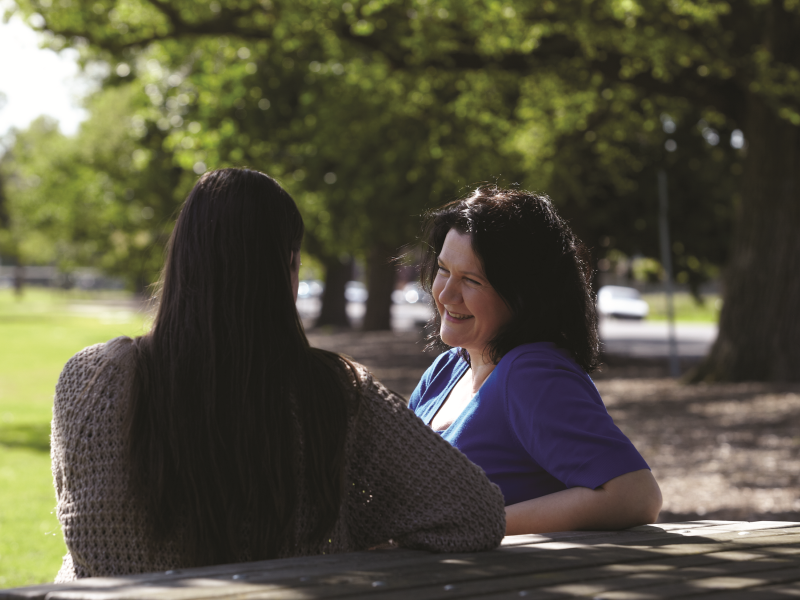Mind Australia mental health practitioners in Queensland are maximising the positive impact of family members and other carers in a young person’s mental health recovery.
Families and carers play a pivotal role in the recovery journey of a young person, but this is often overlooked in mental health care, says Kimberley Nasio, the Service Manager of the Youth Step Up Step Down service in Logan in South East Queensland.
The service offers a short-term (up to 28 days) sub-acute recovery-focussed support for young people (16-21 years) experiencing severe mental health challenges. It is run in partnership between Mind Australia and Metro South Health.
Ms Nasio and her team have developed a range of strategies to overcome barriers to family and carer participation in a young person’s recovery and to amplify the benefits.
“A prevalent challenge encountered in Youth Step Up Step Downs is the divergent views between parents and young people regarding the path to recovery,” Ms Nasio said.
“Other challenges include a young person not having family support, breaking down barriers so staff can engage with anyone that the young person deems as ‘support’ and not specifically a family member, and working families having limited availability to meet with key workers.”
The team have been able to address these challenges through a number of strategies. These include:
- employing a dedicated family engagement worker
- identifying a young person’s key supports, gaining consent to contact them and then connecting with them via the service’s family engagement worker
- regular communication with family members, carers or support people – including information packs, phone calls and email updates
- regular family and supporter events - including weekly dinners at the service and fortnightly group sessions on weekends to accommodate working families.
“Enhancing understanding of family dynamics and involving family members in services can significantly improve engagement and increase the overall wellbeing for both the young person and the family, beyond their stay with the service,” Ms Nasio said.
“Logan Youth Step Up Step Down provides short-term care, so we start building capacity and preparing young people for life after their stay at the service as soon as they arrive. We put emphasis on building relationships with the ongoing treating team, connecting with the local community, and family and supporters being as involved as possible.”
Ann is the grandmother of a former Logan Youth Step Up Step Down service user. Ann says her and partner Jonn were blown away by the support they were offered by Mind Family Engagement Worker Zoe Fritz.
“We are usually the ones to take our grandson to all his health appointments over the years and we have been left out of the discussion with professionals because we are not the parents and we just accept that,” Ann said.
“When Zoe reached out to us via phone and email to say our grandson had identified us as his carers who support him, we were more than happy to help where he needed us.
“After a couple of calls and emails from Zoe and the team we felt a lot more confident in what we could do to better help our grandson. We gained some support and link-ins that we didn’t even know were available to us or that we needed. We felt part of the process and like they cared and wanted us to have a voice and be heard.”
Mind’s Research and Evaluation team measures outcomes across all Mind services, using validated instruments including the Kessler 6 for psychological distress.
Data collected from Logan Youth Step Up Step Down during the 2022/2023 Financial Year showed a reduction in psychological distress for young people between service entry (23.4) and exit (18.2).
“This is a significant reduction in psychological distress and shows that, on average, young people at the service are changing their level of psychological distress from ‘high’ to ‘moderate’, which is much more manageable for a young person and their support network,” Mind Research and Evaluation Manager Dr Laura Hayes said.
“Supporting teams across Mind to share their learnings and strategies like this is important work for us. It gives our service teams, and other organisations, the opportunity to learn from these important on-the-ground experiences that are helping provide the best possible outcomes for service users.”
Outcomes measures data from 39 family members and carers of participants at Logan Youth Step Up Step Down also showed that more than 90% of carers would recommend Mind Australia to others.
Ms Nasio shared the service’s learnings and strategies at the national TheMHS Conference 2024 in collaboration with Dr Hayes, Dr Edith Botchway-Commey and Dr Lauren Gibson of Mind’s Research and Evaluation team, and Mind’s then General Manager – Queensland Operations Mary Streatfield.
For more information about Mind’s range of services, visit the Mind Service finder or phone 1300 286 463.
